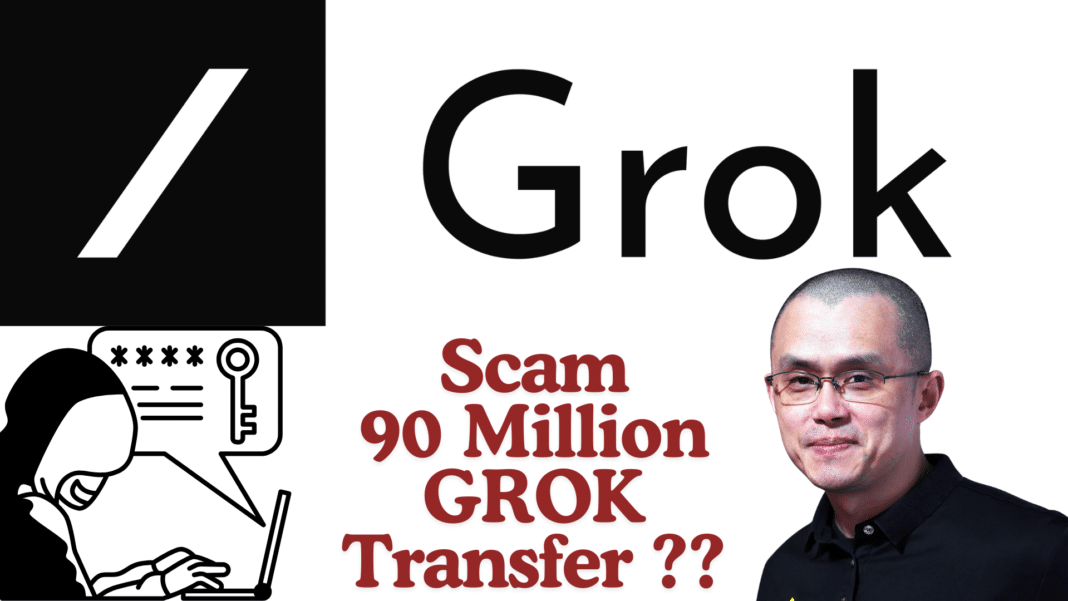A wallet address identified as belonging to Changpeng Zhao (CZ), co-founder and former CEO of Binance, has drawn significant attention after receiving 90 million GroK ($GROK) tokens.
The transaction, flagged by blockchain security firm PeckShield, has sparked concerns over potential fraudulent activity.
PeckShield highlighted that the tokens were distributed using a “multisend” function, a common tactic in scam-related airdrops.
In this case, tokens are sent to high-profile or verified addresses in an attempt to simulate legitimacy and attract unsuspecting investors.
The incident has reignited debates about transparency and trust in decentralized token distributions.
PeckShield Alerts Community to Potential Scam Activity
PeckShield issued a public scam alert on X (formerly Twitter), warning the crypto community that the token distribution is likely a deceptive marketing ploy.
The firm pointed out that the deployer used mass distribution tactics to place GroK tokens in various wallets, including the one labeled as CZ’s.
The method is often employed to fabricate credibility around unknown tokens by associating them with influential figures or established platforms.
The fact that CZ’s name is now being linked, possibly without his knowledge, to GroK has led to heightened skepticism and concern within the industry. Many analysts believe this is a calculated attempt by GroK’s team or deployer to exploit CZ’s reputation.
GroK Token Sees Modest Gains Amid Growing Controversy
Interestingly, despite the fraud warnings and negative publicity, the GroK token has seen a modest rise in value.
As of today, the live GroK price stands at approximately $0.0000000153, reflecting a 6.36% gain in the past 24 hours.

However, key data such as market capitalization, trading volume, and circulating supply remain unavailable, which raises transparency concerns.
Analysts warn that this uptick could be a temporary spike driven by increased attention rather than genuine investor confidence.
Warnings Amplify Amid Ongoing Risk of Airdrop Scams
The situation surrounding GroK underscores a broader issue plaguing the crypto space: the misuse of airdrops as a scam mechanism.
Fraudsters frequently exploit high-profile names to project false credibility and stimulate token purchases.
PeckShield’s warning acts as a strong reminder for investors to remain vigilant and skeptical of tokens that suddenly appear in their wallets, especially those connected to celebrity or influencer-linked addresses.
Investors are urged to conduct thorough research, verify token origins, and refrain from engaging with assets that have questionable distribution histories or unclear project teams.
Also Read: Scam Sniffer Warns of Google Crypto Phishing Links Targeting “Four Meme” Users on BNB Chain
Broader Investigations Highlight Persistent Security Threats
The GroK incident is just one of several warnings currently circulating within the crypto community.
Crypto investigators have uncovered other troubling cases, including a $13 million theft involving the VUSD token due to a vulnerability in the Onyx Protocol’s DAO proposal.
Meanwhile, the Ronin Network is again under investigation following a suspected $9.33 million hack, raising fears of another major breach just two years after its historic $610 million exploit.
These developments reinforce the pressing need for improved security standards, proactive regulatory oversight, and increased investor education to curb the growing threat of scams in the crypto space.
Also Read: Telegram Influencer Scam Alert: ScamSniffer Warns Of New Malware Scam Targeting Crypto Users


